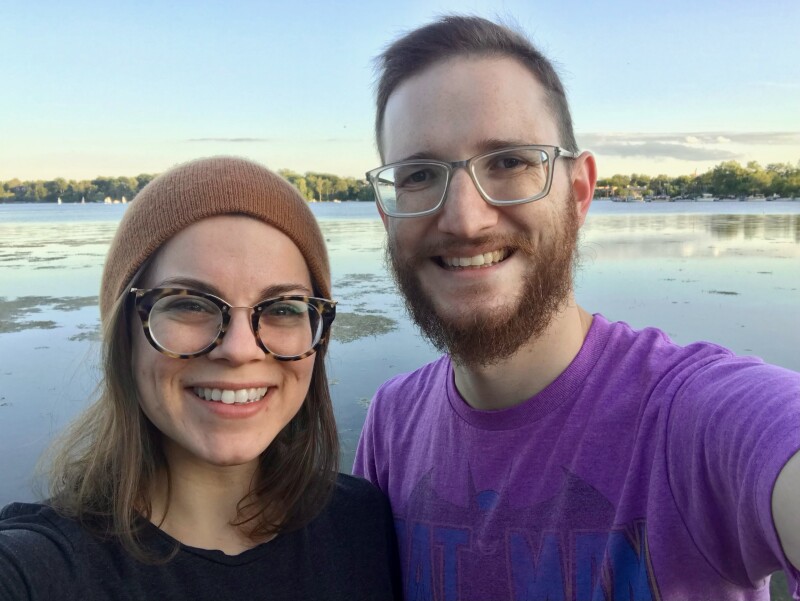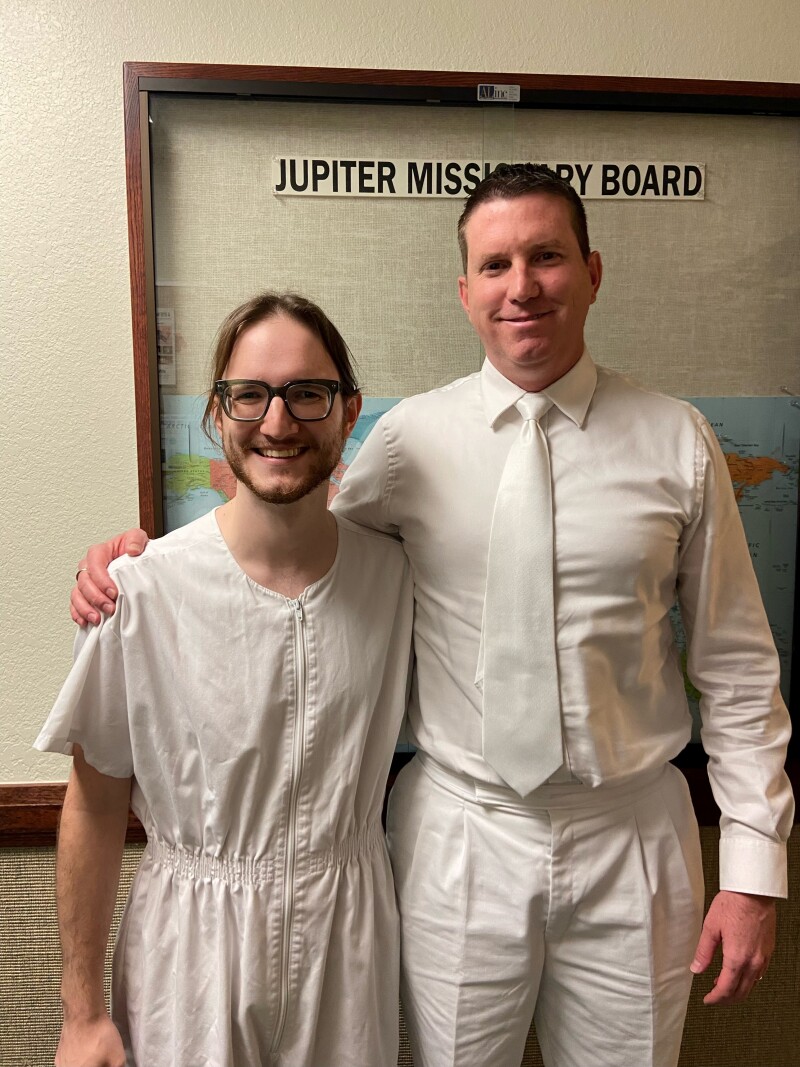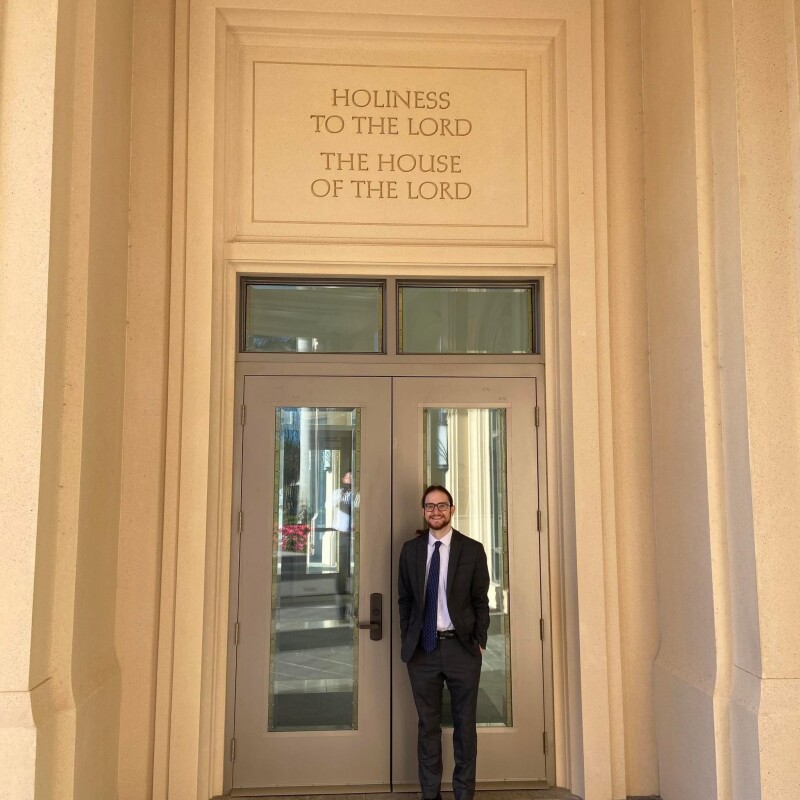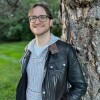Before joining The Church of Jesus Christ of Latter-day Saints in 2022, I’d heard some stereotypes about Latter-day Saints that led me to think they were all the same: same backgrounds, same interests, same family situations, same lifestyles—even the same challenges. But the truth is, we’re all different—some of us in subtle ways, some of us in ways that are much more obvious. As an Autistic man and a convert to the Church, my differences are perhaps a little more obvious. So if you’ve ever looked around at the people on the pews each Sunday and felt like you don’t fit in, you aren’t alone. All my life, I have struggled with those same feelings. But I hope that as I share my story, you’ll see that no matter how lonely you may feel at times, none of us are ever alone, and our differences are needed in the Church of Jesus Christ, whatever they may be.
The Early Signs
I’ve always been a little … different. Since my childhood, there were contradictions in my behavior that were hard for my parents to reconcile. For instance, I demonstrated a knack for reading and speaking before many of my peers. My parents, who were Pentecostal missionaries, can recall listening to me sound out words on billboard signs at the age of two. Yet well into elementary school I struggled with basic spatial tasks, such as tying my own shoes. I was also known to “space out,” meaning I would get completely lost in my own head, my eyes unblinking and my mouth frozen open, essentially forgetting where I was due to hyperfocusing on something. At times, for no apparent reason, I flapped my arms or echoed words or sounds I heard. Eye contact was difficult. I missed obvious social cues and always seemed to say the wrong things at the wrong times. Because of these and other behaviors, I struggled to fit in with my peers, whether in church or at school. I was a loner for years.
My parents knew I faced unique challenges, but they lacked the understanding or the tools to get me further help. Reaching out to psychiatric professionals simply wasn’t a part of their culture. When I presented behaviors that troubled them, they focused on teaching me how to stop the behavior around others. At the time, that seemed to work well enough, but consciously forcing myself to cover up behaviors that were as natural to me as breathing took an emotional toll.
When I was a teenager, my parents divorced—a messy and difficult process that threw my world into a tailspin. Feeling lonely and unseen and doubting both my family and my faith, I walked away from the church of my childhood in a painful break.
“I Want Faith”
In the following years, I drifted in and out of college as I searched for hope. During that time, I was blessed to marry a wonderful woman. Lindsay was patient, saw my struggles, and loved me anyway, but we soon learned that my challenges impacted our marriage in ways we didn’t expect. I had rigid routines, struggled with clear communication, and often became distant from her. I also struggled to maintain steady employment, either inadvertently choosing jobs with toxic environments or simply struggling to keep up the same pace as my coworkers. Again, I felt alone.

In 2020, the COVID-19 pandemic lockdowns kept my wife and me cooped up in a small apartment in Florida, and we began to see my behaviors in all their intensity. We realized I needed professional support. Although I’d seen a therapist (someone without Autism expertise) on and off for years, something was still missing. One night, after a long argument with my wife, I was browsing the internet for resources to help with communication in marriage, and I found a video about undiagnosed Autistic adults with marital problems. It felt like providence; the speaker in the video seemed to be describing me perfectly. Hesitantly, I brought it to my wife: could this be what we overlooked?
Autism affects more people than you might think, and getting a diagnosis as an adult is difficult. First, you need to find a professional who is qualified to screen adults, and they tend to be rarer than child specialists. The testing that follows is emotionally, physically, and even financially draining (adult testing is rarely covered by insurance). But I did it, and though it had taken until I was 32 to discover, the results were clear: I am Autistic.
While the process of getting a diagnosis was challenging, the support that came with the diagnosis was entirely worth it. I began meeting with a specialist who started by helping me identify what was missing in my life. To be a better husband, a better communicator, and a hirable employee, I needed to cultivate happiness and healing. But how? During one particularly raw session, the specialist asked me point-blank: “What do you want in life?” Without hesitation, I blurted out, “I want faith.” Of all the things I could have said in that moment, the word “faith” surprised me. I’d always had an interest in religion, but I lacked a community that truly felt like my own, and my specialist had created a safe enough space that those feelings of longing could finally rise to the surface. After a lifetime of masking my feelings and trying to fit in, this invitation to decide for myself what kind of person I wanted to be was revolutionary.
Coming Home
During this time, I studied many faiths, but among all of them my experience with the Book of Mormon was life changing. Downloading the Church’s Book of Mormon app, I flew through the digital pages, relishing the words of Nephi and Lehi, Alma the Younger, Ammon, and so many more. I was especially drawn to the life of Amulek, a well-off and well-known citizen of Ammonihah who was instructed by an angel to welcome the prophet Alma into his home and who eventually went far from home to bear witness of the gospel among skeptics. As a lifelong loner and a self-described homebody, I wondered if would have had the faith to show such generous hospitality to a complete stranger, let alone leave home for a challenging journey. My heart was thrilled at the story, but more importantly, I felt something different as I read—something deeply satisfying, like I was experiencing something new and yet, at the same time, totally familiar.
When I reached out to the local missionaries, I asked them about this feeling. Being Autistic can make it difficult for me to ascertain what certain feelings are, let alone express them. So as I described to the missionaries the feeling of coming home I experienced while reading the Book of Mormon, the way the words flowed out so easily seemed like something from a wonderful dream I had somehow forgotten. The verses I read felt true, like the scriptures contained a message intended for me, and the idea filled me with a kind of warmth. Was this hope? The two missionaries looked at one another with a grin, and one blurted out excitedly, “That’s a testimony!”
Over the following months, I attended church services with the support and frequent accompaniment of my wife, who’s Jewish. We developed a weekly pattern that still holds today: worshipping in Jewish services on Saturday (the Jewish Sabbath) and gathering with Latter-day Saints on Sunday, where I learned more about the Church. My Autism specialist, who is not a Latter-day Saint, remarked that my depressive mood and anxiety often improved when I talked about my newfound faith.
I continued meeting weekly with the missionaries, taking lessons, reading scriptures, and attending services until, one Sunday morning during sacrament meeting, I had a realization so clear it overwhelmed me. While taking the bread and water, I felt called. With my head bowed in prayer after receiving the sacrament, I noticed that my hand began to involuntarily “stim,” or shake in a fashion that’s difficult to control, a behavior many Autistic people experience in times of great emotion. In that moment, I knew—it was time to come home. I wanted to be a member of this Church more than anything else. A few weeks later, I was baptized.

Walking the Covenant Path
My testimony of the restored gospel of Jesus Christ is one born of practical experience. I can see the undeniable difference in my life after joining the Church. I attest to the power of the Book of Mormon in helping me resist suicidal thoughts and withstand challenging days. Becoming a member has even strengthened my marriage as I’ve continued to learn more effective and loving ways to communicate with and support my wife. Among my other blessings, I’ve also been able to further my education more than I would have thought: this year I’ll receive a master’s degree in South Asian studies. I hope to pursue a career in teaching. In the meantime, I tutor in subjects like Latin and English, and I also advocate for greater disability awareness so people with Autism and other challenges can better thrive in our world today.
Being a Latter-day Saint hasn’t made me any “less” Autistic. For instance, at services I tend to seek out completely empty pews with my wife because that’s where I’m most comfortable—it’s less distracting, and I can also move my hands to my heart’s content. But the restored gospel isn’t about being assured of healing in this life; it’s about learning to walk the covenant path with God’s help in the face of whatever challenges come our way.
My advice to other people with Autism who are seeking to attend services in person is to be proud to be there! Sing with all your heart. Don’t worry about flapping hands or echoed words. If you experience sensory overload, don’t be embarrassed to step outside—your fellow Latter-day Saints will understand. After I moved from Florida to Wisconsin, my new ward family learned what I needed in our meetings and activities, and they were eager to support me. There’s also nothing wrong with advocating for your needs. Those of us who have special challenges deserve to be in holy places as much as everyone else. God calls to each one of us! And if you’re a parent of a child with Autism or a Latter-day Saint who wants to support those with disabilities, please ask questions, be a good listener, practice patience, and remember that we’re doing our best.

I still have challenging days. But now I have the gift of the Holy Ghost to strengthen me. I have the sure knowledge of a loving Heavenly Father. And I have an Elder Brother, my Savior Jesus Christ, who thought of me—in all my differences—even as He hung on the cross. For the first time in my life, I don’t want to die young so the pain will stop. I want to “endure to the end,” and now I believe I can (2 Nephi 31:20).
If you feel different, like maybe you don’t belong in The Church of Jesus Christ of Latter-day Saints, it’s important to remember how much diversity our Church holds. God’s love is big enough for all of us. The restored gospel isn’t just for people who fit a particular mold, for people whose lives seem to be all figured out, or for people who never struggle. Our Savior lived, taught, and died for everyone. Whether we find healing in this life or the next, He promises to walk lovingly by our side as we journey home.


